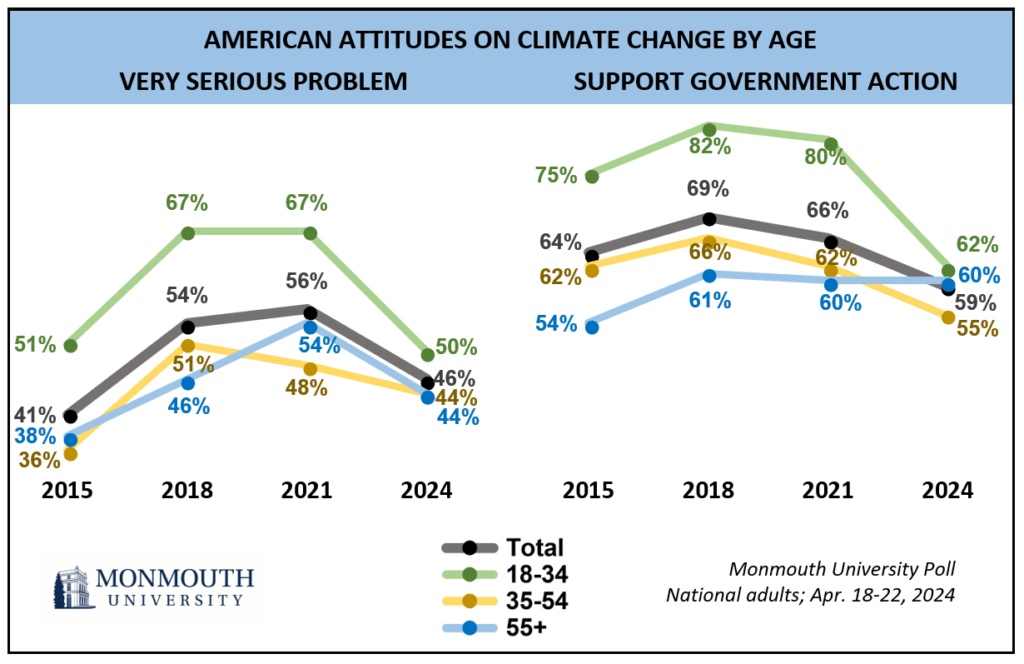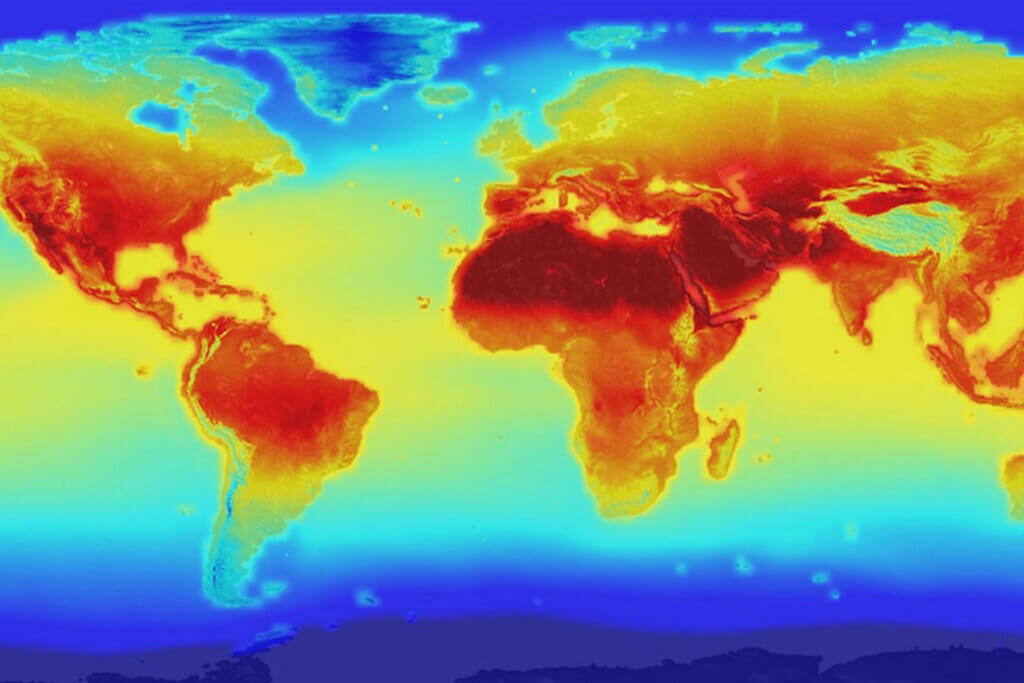West Long Branch, NJ – Most Americans continue to acknowledge the existence of climate change, according to the latest Monmouth (“Mon-muth”) University Poll, but the number who see this as a very serious problem has fallen below half. Support for government action to reduce activities that impact the climate has dipped below 6 in 10 for the first time since Monmouth began polling this topic nearly a decade ago. The poll finds that the drop in the importance and urgency of climate change has been most pronounced among younger adults.
Nearly 3 in 4 Americans (73%) believe the world’s climate is undergoing a change leading to more extreme weather patterns and sea level rise, while 23% say this is not happening. Belief in climate change is down slightly from polls taken in 2021 (76%) and 2018 (78%), but is still nominally higher than it was in 2015 (70%). Nearly all Democrats (92%) believe climate change is happening, which has been fairly consistent across prior polls (94% in 2021, 92% in 2018, and 85% in 2015). Republicans (51%) are the least likely to accept climate change as a reality, which is similar to GOP opinion in 2021 (48%) and 2015 (49%), but down from a momentary jump recorded in 2018 (64%). [Note: the 2018 poll was conducted shortly before then-President Donald Trump disparaged a new federal climate report.] Most independents (71%) believe climate change is happening, but this is down from 81% who said the same in 2021, as well as 78% in 2018 and 74% in 2015.
“Most Americans continue to believe climate change is real. The difference in these latest poll results is a decline in a sense of urgency around this issue,” said Patrick Murray, director of the independent Monmouth University Polling Institute. A Monmouth poll released last month found only 15% of voters view climate change as a determinative issue in how they will vote in the 2024 presidential election, ranking far lower than inflation, immigration, and abortion.
Less than half (46%) of the American public sees climate change as a very serious problem. This number is higher than it was nine years ago (41% in 2015), but is decidedly lower than in more recent polling (54% in 2018 and 56% in 2021). Compared to three years ago, climate change concern has declined by 8 percentage points among both Democrats (77% very serious, down from 85% in 2021) and Republicans (13%, from 21%) and by 13 points among independents (43%, from 56%).
There has also been a drop in support for government action on climate change. Just over half say it is either extremely important (29%) or very important (23%) for the federal government to address the issue. This is down from 6 in 10 who felt this way less than three years ago (33% extremely and 27% very important in September 2021). Currently, 59% support and 36% oppose the U.S. government doing more to reduce the type of activities that cause climate change and sea level rise. While a clear majority continue to support government action, this number is lower than past polling (66% in 2021, 69% in 2018, and 64% in 2015). Most Democrats (89%) support government action on climate change while few Republicans (30%) feel the same. These results are nearly identical to 2021. However, support among independents has dropped significantly over the past three years (55%, down from 67% in 2021).
“Support for climate action remains relatively high in absolute terms, but it has softened due to a drop in the sense of urgency on this issue, particularly among younger adults,” said Murray.

The percentage of Americans between the ages of 18 and 34 who see climate change as a very serious problem has fallen by 17 points in the past three years (50%, down from 67% in 2021), compared with smaller declines among those who are 35 to 54 years old (44%, down from 48%) and those age 55 and older (44%, down from 54%). Support for government action to reduce climate change activities stands at 62% among those age 18 to 34, which is similar to current support levels among older Americans (55% age 35 to 54 and 60% age 55 and older). However, support among younger adults has dropped significantly from prior polls (80% in 2021, 82% in 2018, and 75% in 2015), while it has remained fairly stable among Americans age 35 and older during the past decade.
In terms of pinpointing exactly when the shift in attitudes about climate change occurred, most of the questions included in the Monmouth poll have been asked every three years since 2015. However, the question on the importance of government action was added in early 2021 and has been asked multiple times since then. The findings on this question suggest the dip in climate concern occurred between late 2021 and the fall of 2022. Results from a Pew Research Center poll taken last year also suggest that a dip in public concern about climate change occurred around 2022.
Public opinion remains mixed on the degree to which human behavior contributes to change in the climate. Just over one-third (34%) say climate change is caused mainly by human activity while 31% say human activity and natural changes in the environment play equal roles. Another 7% put climate change down mainly to natural causes, with the remainder saying climate change is not happening (23%) or are not sure if it is happening (4%). Just over half of Americans (51%) say there is still time to prevent the worst effects of climate change while just 17% say it is too late.
The Monmouth University Poll was conducted by telephone from April 18 to 22, 2024 with 808 adults in the United States. The question results in this release have a margin of error of +/- 4.1 percentage points for the full sample. The poll was conducted by the Monmouth University Polling Institute in West Long Branch, NJ.
QUESTIONS AND RESULTS
(* Some columns may not add to 100% due to rounding.)
[Q1-27 previously released.]
28.How important is it for the federal government to address the issue of climate change – is it extremely important, very important, just somewhat important, or not important?
| Trend: | April 2024 | Oct. 2022 | Sept. 2022 | Sept. 2021 | Jan. 2021 |
|---|---|---|---|---|---|
| Extremely important | 29% | 23% | 24% | 33% | 27% |
| Very important | 23% | 27% | 25% | 27% | 33% |
| Just somewhat important | 26% | 23% | 19% | 21% | 23% |
| Not important | 22% | 26% | 32% | 19% | 16% |
| (VOL) Don’t know | 0% | 1% | 1% | 1% | 1% |
| (n) | (808) | (808) | (806) | (802) | (809) |
29.Do you think that the world’s climate is undergoing a change that is causing more extreme weather patterns and the rise of sea levels, or is this not happening?
| Trend: | April 2024 | Sept. 2021 | Nov. 2018 | Dec. 2015 |
|---|---|---|---|---|
| Yes, is happening | 73% | 76% | 78% | 70% |
| No, is not happening | 23% | 18% | 16% | 22% |
| (VOL) Don’t know | 4% | 6% | 5% | 8% |
| (n) | (808) | (802) | (802) | (1,006) |
30.Would you say climate change is a very serious, somewhat serious, or not too serious problem?
| Trend: | April 2024 | Sept. 2021 | Nov. 2018 | Dec. 2015 |
|---|---|---|---|---|
| Very serious | 46% | 56% | 54% | 41% |
| Somewhat serious | 20% | 14% | 17% | 19% |
| Not too serious | 6% | 6% | 7% | 9% |
| (VOL) Don’t know | 0% | 0% | 0% | 1% |
| Climate change is not happening (from Q29) | 23% | 18% | 16% | 22% |
| Not sure climate change happening (from Q29) | 4% | 6% | 5% | 8% |
| (n) | (808) | (802) | (802) | (1,006) |
31.Is climate change caused more by human activity, more by natural changes in the environment, or by both equally?
| Trend: | April 2024 | Sept. 2021 | Nov. 2018 | Dec. 2015 |
|---|---|---|---|---|
| Human activity | 34% | 35% | 29% | 27% |
| Natural changes in the environment | 7% | 8% | 10% | 8% |
| Both equally | 31% | 32% | 37% | 34% |
| (VOL) Don’t know | 0% | 1% | 2% | 1% |
| Climate change is not happening (from Q29) | 23% | 18% | 16% | 22% |
| Not sure climate change happening (from Q29) | 4% | 6% | 5% | 8% |
| (n) | (808) | (802) | (802) | (1,006) |
32.Do you think there is still time to prevent the worst effects of climate change or is it already too late?
| Trend: | April 2024 | Sept. 2021 | Nov. 2018 |
|---|---|---|---|
| Still time | 51% | 51% | 54% |
| Too late | 17% | 19% | 16% |
| (VOL) Nothing we can/should do about it | 2% | 2% | 4% |
| (VOL) Don’t know | 3% | 4% | 5% |
| Climate change is not happening (from Q29) | 23% | 18% | 16% |
| Not sure climate change happening (from Q29) | 4% | 6% | 5% |
| (n) | (808) | (802) | (802) |
33.In general, do you support or oppose the U.S. government doing more to reduce the type of activities that cause climate change and sea level rise?
| Trend: | April 2024 | Sept. 2021 | Nov. 2018 | Dec. 2015 |
|---|---|---|---|---|
| Support | 59% | 66% | 69% | 64% |
| Oppose | 36% | 27% | 22% | 26% |
| (VOL) Depends | 1% | 2% | 4% | 4% |
| (VOL) Don’t know | 4% | 4% | 5% | 7% |
| (n) | (808) | (802) | (802) | (1,006) |
[Q34-37 held for future release.]
METHODOLOGY
The Monmouth University Poll was sponsored and conducted by the Monmouth University Polling Institute from April 18 to 22, 2024 with a probability-based national random sample of 808 adults age 18 and older. Interviews were conducted in English, and included 163 live landline telephone interviews, 349 live cell phone interviews, and 296 online surveys via a cell phone text invitation. Telephone numbers were selected through a mix of random digit dialing and list-based sampling. Landline respondents were selected with a modified Troldahl-Carter youngest adult household screen. Interviewing services were provided by Braun Research, with sample obtained from Dynata (RDD, n=484), Aristotle (list, n=168) and a panel of prior Monmouth poll participants (n=156). Monmouth is responsible for all aspects of the survey design, data weighting and analysis. The full sample is weighted for region, age, education, gender and race based on US Census information (ACS 2021 one-year survey). For results based on this sample, one can say with 95% confidence that the error attributable to sampling has a maximum margin of plus or minus 4.1 percentage points adjusted for sample design effects (1.41). Sampling error can be larger for sub-groups (see table below). In addition to sampling error, one should bear in mind that question wording and practical difficulties in conducting surveys can introduce error or bias into the findings of opinion polls.
Demographics (weighted)
Party (self-reported): 25% Republican, 44% Independent, 31% Democrat
Sex: 49% male, 50% female, 1% other
Age: 30% 18-34, 32% 35-54, 38% 55+
Race: 61% White, 12% Black, 17% Hispanic, 9% Asian/other
Education: 38% high school or less, 29% some college, 17% 4 year degree, 16% graduate degree
Click on pdf file link below for full methodology and crosstabs by key demographic groups.




